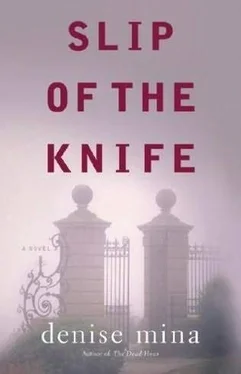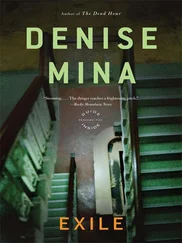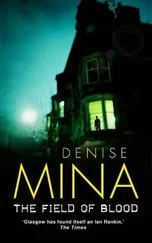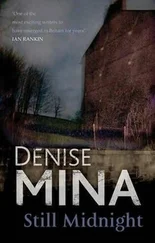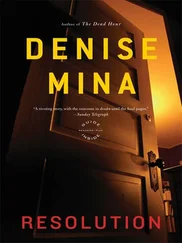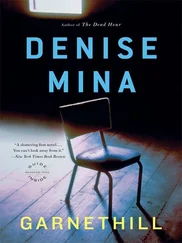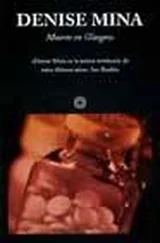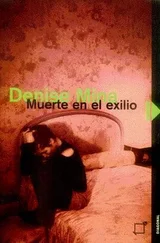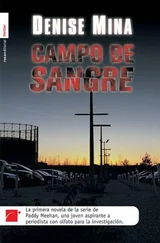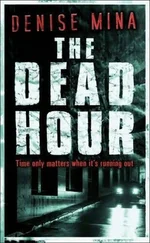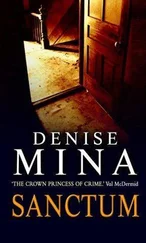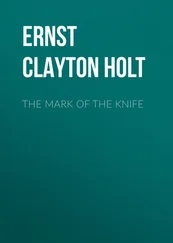He smiled as he stepped onto the pavement. New York. Everything was brighter then and it wasn’t even very long ago. Over the cusp of the hill came an old man in a deerstalker hat and overcoat, dragging an elderly King Charles spaniel out for a stroll in the middle of the night. Incontinent dog or insomniac owner. Martin sank his hands into his pockets, keeping his head down, pretending to feel for house keys as he walked past the old man.
“Come on,” the old man muttered, attentive to his charge. He looked up to McBree, keen to engage with the only other soul in the street at that hour, but McBree kept his head down, frowning, preoccupied, a man on his way home. He strode on to the entrance to the estate.
In keeping with his training, he kept his eyes on the road in front of him, not glancing around. People who belong in a place don’t swivel their heads like lost tourists. In a familiar environment no one looks around. People walk blindly, thinking; most let their faces drop into a half scowl.
The road surface changed at the mouth of the estate, from the patched tarmac on the old main road to yellow brick, set in a hounds-tooth pattern, with matching slab pavements and an orange lip of bricks separating them. It was a new estate. The bricks had not yet had the time to settle into the ground and become irregular, no corners jagging upwards to trip the toe or wobbly slabs with secret puddles underneath to splash the shin. It was pristine.
He allowed himself an orientating glance upward. The map of the shallow streets was pretty clear but it was always possible to follow a pavement to the wrong corner, especially when it all looked the same. The houses were small and regular, expensive still because they were in a posh area but unremarkable nonetheless. The cars parked in the driveway showed the real income: big foreign cars, a sports car, all sitting next to freshly laid lawns living out their first summer. By next year the care of the owners would tell. The lawns wouldn’t be uniform then; some would flourish, others would die back to dandelions and alopecia patches.
The roads were ablaze. Yellow streetlights were dotted along the yellow pavement, their bulbs new, placed so that each pool of brightness formed a Venn-diagram overlap with the next. The houses had porch lights that remained on even when all the lights in the house were off. It was three in the morning and the place was bright as day.
A problem with new estates, and he had come across this before in Poleglass, was that they had no dark back alleys to skirt through and wait in. Here the houses had small rear gardens backing onto other small gardens, and nothing between them but a wooden fence. The back wasn’t an option.
He came up to the house and saw a shiny black Merc sitting in the driveway, glinting under the porch light. All the windows were dark.
Without looking up or slowing his stride, McBree scanned the house. No alarm box blinking a warning. Front door, plastic, big window into front room, curtains open, garage on the other side. Second floor, small window, bathroom or bedroom, big window, master bedroom. New developers liked to squeeze en suites into cupboards in these things, just for the spec in the estate agent’s window, so a good bit of the second floor would be taken up with that room. There was a second bedroom though, he knew that. The guy wouldn’t have a Merc in the driveway and make his kid sleep on the floor when he came for a visit.
A TV comedian. McBree had seen the show. Not funny but the guy seemed angry and looked tall, six foot one or so, unless everyone else in the show was very small. It was hard to guess. Ex-policeman. It would be a pleasure.
Without a dip in his stride he walked down the driveway and cut off to the side of the house, around the corner where the empty bins were. He stopped. A deep velvet blackness enveloped him. He let his face relax and pulled his latex gloves on. He looked up at the side wall of the house next door. No lights on, and only one small window on each house, high up, the neighbors’ netted, the target clear but dark. He stepped back against the dividing fence and looked more carefully. Clear but even in the darkness he could see the outline of bottles neatly regimented, shoulders to the glass. Main bathroom. The small window at the front was the second bedroom.
A high slatted fence ran between the properties and there was a gate into the backyard, locked with an old-fashioned black bolt lock. He fingered it and smiled. It wouldn’t have kept a chicken out.
Reaching into his pocket, he felt for his old skeleton key, the cold, firm shank sitting comfortably in his hand. It was a while since he’d used it. Most locks were more complex now. He spat on the bit, rubbing the saliva over the teeth to silence the entry into the lock, and tried it. The lock sprang back with a loud, unaccustomed crunch. McBree stood perfectly still for a moment, listening for movement. Nothing. He spat silently onto his fingertips and rubbed the exposed hinges on the gate, trying it tentatively at first until he was sure it made nothing louder than a mild creak. Pausing only to pull his balaclava on, he adjusted the eye holes and slid through the gate into the garden.
A patch of grass surrounded by the high fence, a glass conservatory, shallow, leading into a kitchen. A television on standby sat on a table, the lone red eye lighting the floor in front of it. The place looked tidy, no clothes or newspapers left on the floor or counter tops, which was good: it was unlikely there would be any debris lying around to trip over. Not like the photographer’s house. Shit everywhere. Val would have had a fit if she’d seen that. She liked the house perfect. It was her one sphere of control. Her mother had been the same.
The back door was plastic like the front but windowed, a long mottled strip of glass in a PVC frame. He looked at the lock, standing close in so that his shadow would blend in with the line of the house if anyone looked. It was complicated, a bolt and a Yale, a lot of work.
He turned back to the conservatory. A ground-level glass panel could be cut and slipped out of the frame easily enough and he would fit in sideways. He paused, half listening for noise inside and out, but really savoring the moment. These quiet times, when his mind was fully occupied with an immediate problem, when his hot breath gathered as droplets of moisture inside his mask, he was content.
He wanted a cigarette. He always wanted a cigarette. Sometimes while he was actually smoking he craved a cigarette.
He took the penknife from his pocket, checked carefully with his finger that the blade was exposed, and spat a long line of saliva down the glass. He’d left saliva at a scene before but he was the most common blood group and the police would be steered away from him even if they spotted it. The blade scratched quietly down then across, and he pushed with his fingertips, starting when one edge of the glass snapped and the muffled crack echoed across the lawn. No movement.
Taking hold of the edge, he pulled first one section out, then the next and the last. Just wide enough. He squared his shoulders to the hole and wriggled in easily, landing on the cold floor like a snake shedding its skin.
He stood up, looked around, padded silently through the kitchen to the hallway-carpeted, better. He turned the locks on the front door, snibbing them so that both would be ready for a quick exit, and watched the door in case it fell open. Fine.
Upstairs, padding the steep carpeted steps, moss green, to the landing. Stop. Breathing behind one door, the master bedroom, a man snoring in a light, regular whistle. The bathroom to the side, where the window looked over the alley. The door to the second bedroom straight ahead.
Stop.
Nausea. Confused images. His own grandson sleeping over on New Year’s Eve, nuzzled up to Val on the settee, his cheek resting on her thigh, and McBree creeping through the dark of a house to harm him.
Читать дальше
